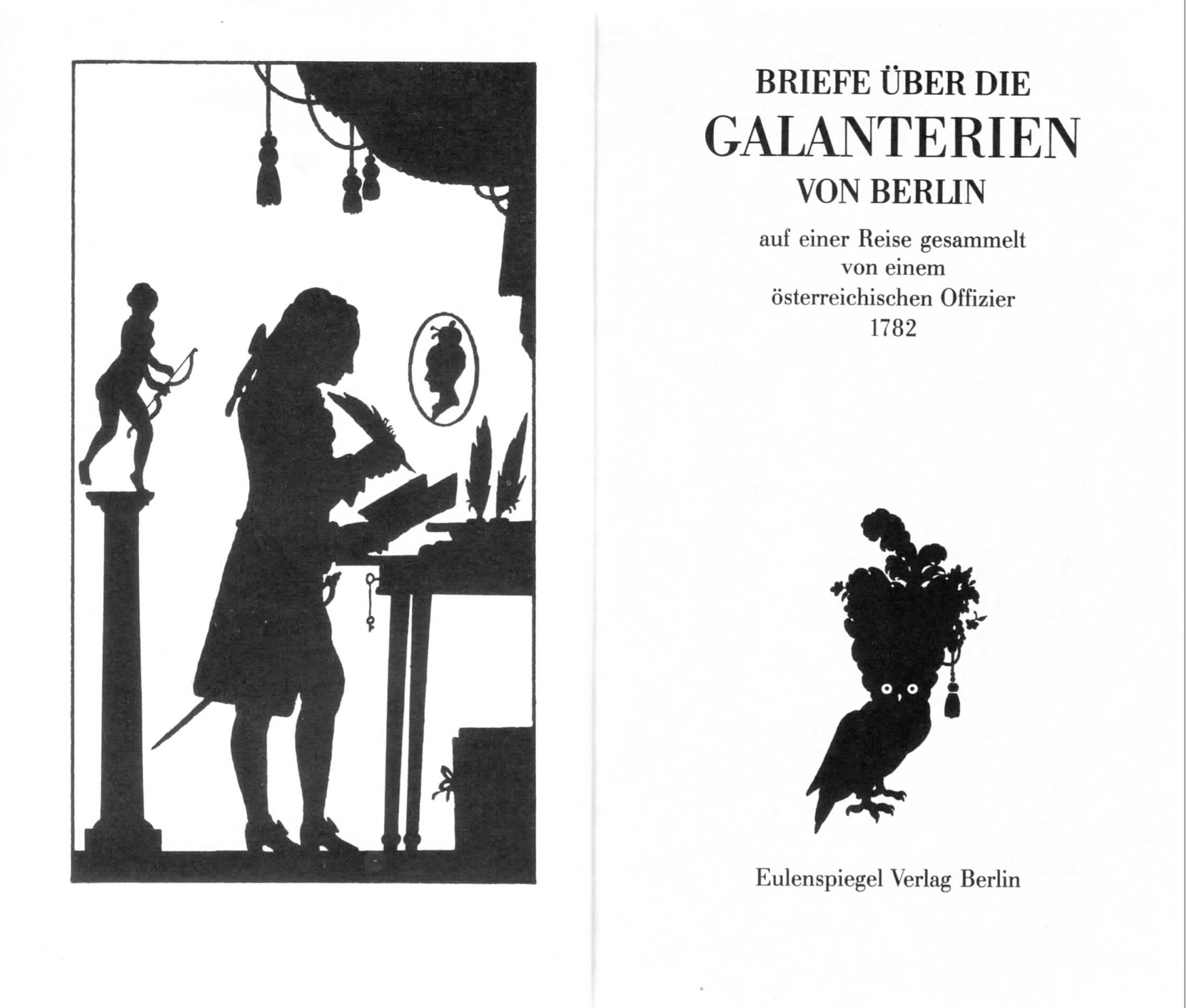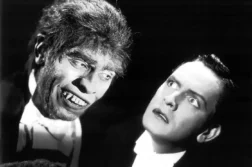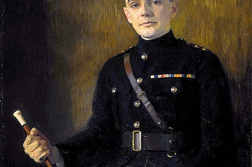HISTORIES OF HOMOSEXUALITY in the Germanic world tend to begin in the middle of the 19th century. That’s where the term “homosexuality” was coined, by Karl Maria Kertbeny, in 1867. It’s where political activism began with Karl Heinrich Ulrichs (1825–1895) and continued with Magnus Hirschfeld into the 1930s. Seldom do historians dive further back in time. This is surely an oversight, for the Age of Goethe was the height of the Romantic cult of friendship, and it’s a short leap from there to homoerotic relations and sexual possibilities. One tipoff that this fixation on “friendship” went beyond the conventional definition is that it was accompanied by a re-awakened interest in Greek mythology and Greek love in all its forms. In fact, there are passages in Goethe’s own writing that belong in any gay anthology.
Briefe über den Galanterien von Berlin, a travelogue by an anonymous Austrian officer published in Vienna in 1782, might make it into such an anthology, albeit in a different section. For this eyewitness account of sexual mores observed during a sojourn of fifteen months in Berlin is far from lyrical in its praise. Indeed, it passes stolidly reactionary judgment on Berlin’s “excesses”—or purports to do so, expressing horror in rhetorical flourishes on every page. For us, what matters is not what this anonymous author thinks about these goings-on but the fact that he reports on their existence.
These thirty letters [three in particular, which appeared in the July-August 2019 issue]deal specifically with “sodomy” and “pederasty” and offer clues as to why silence was the watchword throughout the 18th century. Perhaps the key factor was the law, an issue addressed by Letter 16. Lo and behold, this staunchly conservative observer quotes at length the 18th-century Italian criminologist Cesare Beccaria (1738–1794), a leading thinker of the Enlightenment. Beccaria argued that sodomy was not a crime but instead a weakness of “animality.” The enlightened absolutism of Kaiser Joseph II was reversing the censorship that had prevailed under his predecessor, the puritanical Maria Theresa. Under Joseph, Austria became the first European land to abolish the death penalty for sodomy, in 1787.
Counter-revolutionary Prussia didn’t get around to that until 1794, though in practice no one was burned to death for homosexual acts after 1740. (England maintained the death penalty for sodomites until 1861.) The Prussian court was also well connected to Enlightenment thinkers. Voltaire spent considerable time there; indeed, our Austrian officer suggests holding Voltaire responsible for rendering fashionable the homosexual profligacy he had witnessed in Berlin. While Julien Offray de la Mettrie’s (1709–1751) Anti-Sénèque was banned throughout Prussia practically the moment it appeared (he wrote it in Potsdam in the last year of his life), its argument for the relativity of sexual mores and the ultimate sovereignty of the pleasure principle was gaining acceptance. Although Frederick poked fun at the pedophilia of the Jesuits, he himself was known to have cultivated a love for soldiers and guards in his all-male world. In retrospect, Prussian society was evolving into a recognition and even an acceptance of homosexual identity.
Our curious Letter 16 cites another jurist of the time. Hofrath Sommel evokes the biblical story of Onan in order to shift the interpretation from the religious to medical discourse, a tendency that would accelerate throughout the 19th century, until Tissot’s Onanisme became the century’s bestseller, going through 75 editions. Our Austrian officer glides smoothly from homosexuality to masturbation, scarcely pausing to differentiate two depravities that to him are worthy of similar legal treatment. He wants both stamped out, but from a legal standpoint his final judgment wavers. It is almost funny to read how he goes back and forth from sentence to sentence, calling for extreme measures only to recommend clemency. He becomes so obsessed with masturbation that he seems to let the libertine off the hook. The reasoning seems to be that since masturbation leads to promiscuous same-sex relations, it is masturbation that must be addressed. As for the abomination of sodomy, the author agrees with the progressive criminologists of the time in trusting that educational reforms can root out the problem, specifically by abolishing boys’ schools in favor of co-ed institutions.
Briefe über die Galanterien von Berlin has none of the militancy of the Encyclopedists. The polemical intent of the latter is charted by Robert Darnton in his Forbidden Best-Sellers of Pre-Revolutionary France (1995). The Austrian officer’s letters are leagues behind a work such as Thérèse philosophe (1748), for instance, in which free thinking is associated with sexuality. The Austrian officer reiterates a reactionary conservative view that presupposes a common moral standard, an unquestioned assumption of what is natural. The friend to whom he writes is conveniently engaged to be married, and he feels compelled to fuss over the virtue of his friend’s fiancée. She must not fall upon any of his X-rated material. He has something sensationalist to reveal and seems to revel as one playing with fire.
Neither the Prussian ruler nor his homosexual brother Prince Heinrich ever receives mention in these letters. The author’s milieu is elsewhere—out on the streets, where a certain “fashion” has taken hold, so that the officer can report on a well-developed network of depraved but sophisticated, well-heeled men who know what they like and go for it. This is a whole clandestine subculture organized around a specific social identity. His outings begin in good company; he freely admits that these men are elegant. They are “warm brothers” (warme Brüder). It is interesting that this term for homosexual men persisted in common usage in Germany until after World War II. The author meticulously records what he sees in the private fumoir where men meet boys, right down to the complex interplay of dress code signals and haircut styles.
The Austrian officer is “between men,” to borrow Eve Kosofsky Sedgwick’s term for the slipping boundary between homo-sociality and homosexuality in this general period of Western history. Can it be that the Austrian officer’s ambivalence about sodomy stems from ties he has forged with some of its practitioners? From the way the whole warm brotherhood goes unnamed, one can assume he has been sworn to secrecy. His chaperone is Herr W___, and we never learn a thing about him or about the relationship between the two. One may wonder how he has gained such easy and total access to the underground. How thick with them is he? While the writer seems confident that no suspicion will reflect on him, today’s reader might detect a trace of the homosexual panic described in Sedgwick’s Epistemology of the Closet.
The Austrian officer professes horror over the exchanges he bears witness to between heavy-set upper bourgeois men and their cooperative mignons. He feels compelled to flee this den of iniquity. But he goes back the next day, and the next, unable to contain his curiosity, titillated by his “new discoveries.” The curiosity to which he alludes is a familiar feature of texts that shy away from outright apology, for there is no doubt in his mind that homosexuality, or pederasty as he calls it, is a bestial vice. No sooner has the author expressed revulsion than he presents, in perfect devil’s advocacy form, another point of view, theirs, quoting them as they evoke the Greeks and Romans.

These letters are not private, whatever he pretends, for he has published them. They are not fiction, but they are certainly more than the record of a police report. Only their anonymity might suggest a report written up for the police, if it weren’t for the literary convention brought into play, similar to Montesquieu’s Lettres persanes (1758).
In any case, we needn’t speculate as to who the author was, because he came out two years later, in 1784, as one Johann Friedel, born in 1755, indeed Viennese, but hardly an officer. In fact, he issued from a military family, but after a stint of military service, he turned to theater and the acting profession. This is the work of a 27-year-old who, one year later, as if to disclaim his fifteen-month travelogue, went on to publish Briefe aus Wien: Verschiedenen Inhalts an einem Freund in Berlin, this time fifty fictional letters mainly attacking the Church, the Pope, and religion in general. This second text is even more firmly anchored in its day, reflecting the Enlightenment absolutism of the reign of Joseph II. Friedel justifies himself as author of the Berlin text on the grounds of his potentially contributing to human knowledge. This honors the Enlightenment ideal of spreading information, fostering widening spheres of discussion including the medium of the letter.
For all Friedel’s hope that his text would contribute to the understanding of human behavior, it seems not to have enjoyed much in the way of circulation. It’s astonishing that no English translation has hitherto been available of a text that has so much to offer, such a rare window into sexual politics in late 18th-century German society, the era of Frederick II of Prussia and Joseph II of Austria.
David Tacium, PhD, based in Montreal, is the author of the novel Taking Down the Golden Boy. His doctoral thesis is titled Dandyism & Crisis in 19th Century Masculine Identity (in French).






